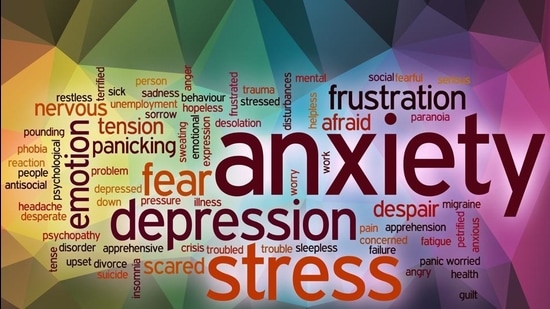Stress hits the bottom line – in more ways than you think
Corporates will pay a heavy price if they don’t understand the implications of mental health. Make well-being a priority for employees
There is this riddle among children. A ship is anchored in a harbour where the tide recedes one foot every hour. The ship’s ladder, which leads into the water, has rungs that are a foot apart. How many hours would it take for the water to drop three rungs of the ladder as the tide lowers? The intuitive answer would be three hours — but it’s wrong. When the tide recedes, the ship lowers with it and the rungs of the ladder remain same in relation to the water. If one were to use the ladder’s rungs as a benchmark, they would miss the fact that the ship has come down by several feet.

The pandemic has affected each of us to varying degrees. A year of isolation, unnatural and cramped confinement, loss of social interaction, death of loved ones, loss of jobs, uncertainty about the future and several similar concerns are taking a heavy toll on each of us, but because the “ladder” remains where it is, most corporate leaders are unaware of the magnitude of the crisis facing their teams and organisations.
Mental health, specifically depression, was already a gargantuan crisis well before Covid-19. The World Health Organization had predicted depression to be largest global health burden by 2030 — ahead of heart diseases or cancer. They were wrong in their estimate by almost 10 years. Depression is now the leading medical burden in the world. By extension, it is also the leading cause of corporate inefficiency and yet remains unaddressed for several reasons.
First, mental health is a taboo in most societies and definitely pariah status in corporates, which idealises the strong, stoic leader. Stress, anxiety and depression are viewed as weaknesses and anyone professing them is more likely to be eased out of the organisation than to be helped out. Second, most leaders don’t understand the construct of mental health. The statistic that one in five Indians is undergoing some form of stress hides the fact that, this “one in five” is a round robin that affects each one of those five at some point, with varying degrees of damage.
Most importantly, while corporates use sophisticated tools for measuring physical presence and shallow work of their employees, they don’t meaningfully gauge their creative engagement or commitment to the organisation and colleagues. It is ironic that organisations, which schedule downtime for maintenance of their plant equipment to preserve their efficacy, believe that their personnel can continue to function effectively without any mental and emotional care. Consider these paradoxes.
Working from cramped, underresourced environment of their homes with little or no contact with teammates, for longer hours, without the relief of social friends and yet being expected to deliver the same quality of work as before, is an unrealistic ask — yet the norm among corporates. Several indicators of social stability such as divorce rates, broken relationships, suicides (especially among the young), financial distress, physical and emotional health are all plummeting alarmingly, and, yet, the expectation from the employees is that they will somehow become happy and positive after logging into the workplace. The expectation that an employee who indulged in road rage (another sign of social stress) on the way to work will become an empathetic team player when he enters the campus would be laughable if it wasn’t so sad.
Each of us has a finite amount of physical and emotional reserves, which get whittled away with every instance that induces stress, whether caused by professional, personal or social anxieties. With the increase in work cadence, under frustrating conditions, this limited resource isn’t getting replenished at the rate of exhaustion. The mask, arguably the most powerful symbol of zeitgeist, is perhaps an apt one. Our faces are hidden, our voices are muffled and our breath is constrained. So, no one knows how we feel, our cries for help are unheard, and we are all waiting to exhale.
A large percentage of the employees are running on fumes. And corporates will pay a heavy price if they don’t see this clear and present danger.
A common refrain heard these days is “taking life day by day”. This innocuous statement conceals the ominous danger looming ahead. Taking life one day at a time might be good pop psychology advice, but it also indicates the loss of agency over a horizon. Imagine the implications to a corporate if their head of strategy, or any other strategic leader for that matter, chooses the mindset of living one day at a time. Or the implications for industries such as insurance, research, infrastructure projects or specialisation studies if the current or potential workforce start thinking in such temporal terms. Or the implication for policies such as climate. The financial damage potential of anxiety is huge.
This is an opportunity for corporates to accord the same importance to mental well-being, as they do for the physical safety, of their employees. Over recent decades, corporates have come a long way in terms of workplace safety because they realised the revenue and reputational costs. We need to create a similar environment when it comes to mental health. Focus on mental health is not some charitable feel-good initiative.
It must be done with a hard eye on the financial performance of companies. Laptops in place of desktops, smartphone allowances, flexible hours of working and work from home were all instituted for their financial returns than merely employee convenience.
Similarly, organisations must embark on rebuilding good mental health and morale through a programme as systematic and rigorous as it would for any of its organisational improvement initiatives. Otherwise, no matter how well they captained their ships during this period, it will be of little use if she has already run aground.
Raghu Raman was founding CEO, Natgrid
The views expressed are personal





